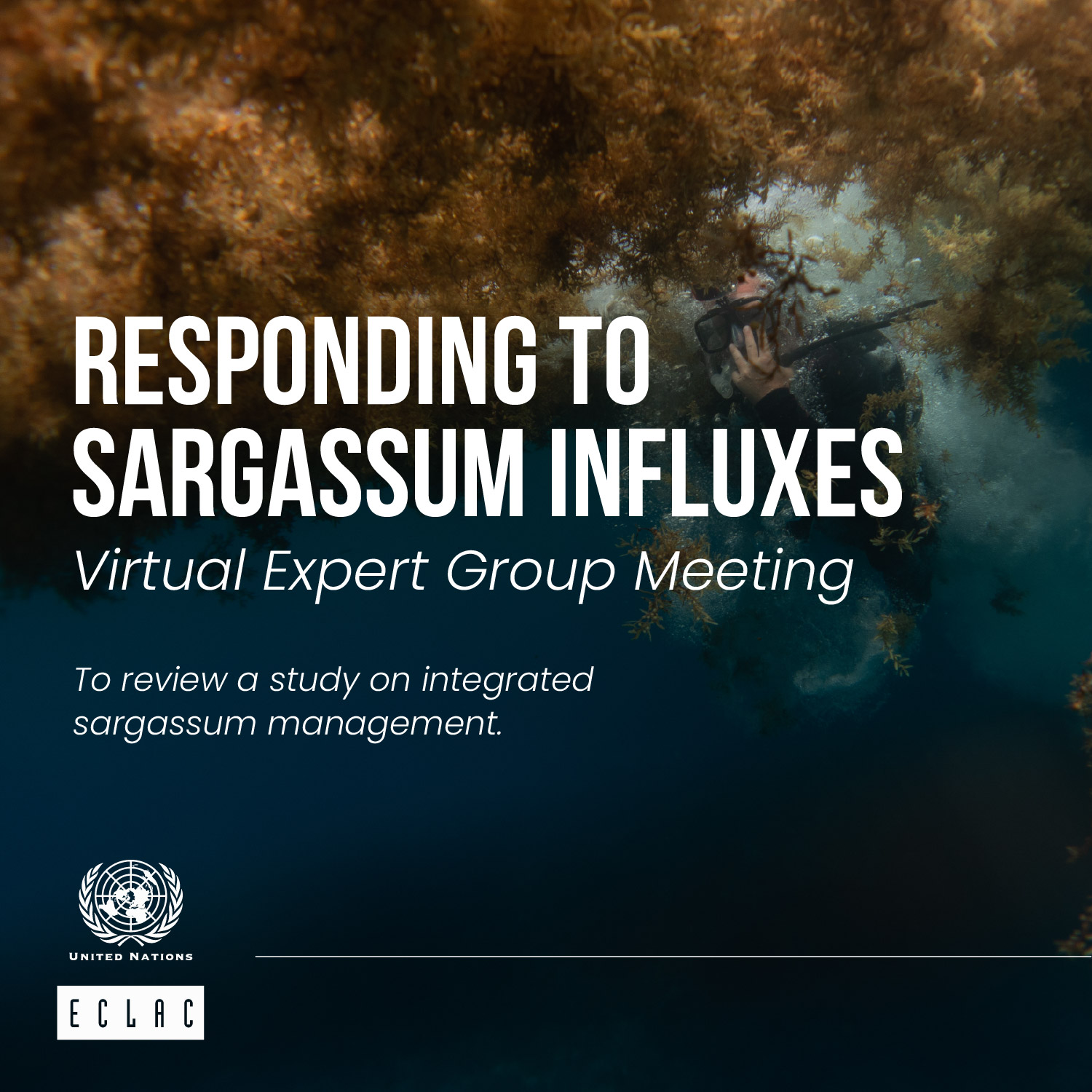Virtual Expert Group Meeting on Responding to Sargassum Influxes
Work area(s)
Teaser
An Expert Group Meeting to review a study titled “Responding to Sargassum Influxes through Integrative and Adaptive Natural Resources Management Approaches in the Caribbean SIDS Region- An Exploratory Framework
Event information

Date
9 Jul 2025, 09:00 - 12:00Event type
Participation
Caribbean Small Island Developing States (SIDS) face significant environmental, economic, and social challenges due to the impacts of the massive influxes of Sargassum seaweed (henceforth, "Sargassum"). Traditional reactive responses have proven insufficient to manage these recurring Sargassum blooms effectively' given the scale, volumes, varied geographic and seasonal distribution, and the absence of any established management systems for the impacted countries. With the continued annual recurrence of these blooms, governments and developmental partners are shifting towards proactive, sustainable management strategies. This study proposes an exploratory framework based on the principles of integrative and adaptive natural resources management (IANRM) and its application to Sargassum management. The framework integrates diverse management strategies, considers interconnected environmental, social, and economic factors in stakeholder engagements, and promotes adaptive learning. Key components include having national policies and legislative frameworks, establishing or strengthening national institutional arrangements, developing robust monitoring and forecasting systems, implementing diversified collection and safe management technologies, promoting value-added product development, research, and development, as well as financing and strengthening regional and international cooperation. Adopting an IANRM approach enables a shift from reactive crisis management to proactive resilience, potentially transforming Sargassum from a challenge to a valuable resource while safeguarding coastal ecosystems and livelihoods. The study provides recommendations for future research on implementing an IANRM approach, thereby promoting sustainable Sargassum management in the Caribbean SIDS region.
Schedule
Schedule
9–9.10 am: Opening of the session
- Welcome remarks by Miosotis Rivas-Peña, Director, ECLAC subregional headquarters for the Caribbean
- Acceptance of Agenda
Facilitator: Artie Dubrie, Coordinator, Sustainable Development and Disaster Unit, ECLAC subregional headquarters for the Caribbean
____________________________________________________________________________________________________
9.10–9.30 am: Presentation of study: "Responding to sargassum influxes through
integrative and adaptive natural resources management approaches in the
Caribbean SIDS region- an exploratory framework"
- This session will present the key findings and recommendations from the study. The presentation will provide an overview of the complex challenges for the safe management of the massive sargassum influxes facing the Caribbean SIDS region. It then offers conclusions and recommendations supporting a public-sector-driven, multistakeholder integrated and adaptative management approach.
Facilitator: Artie Dubrie, Coordinator, Sustainable Development and Disaster Unit, ECLAC subregional headquarters for the Caribbean
- Intervention: Global and Regional Interactions on the Sargassum Bloom in Latin America and the Caribbean: Pathways for Shared and Sustainable Solutions.
Rayén Quiroga, Chief, Water and Energy Unit, ECLAC HeadOffice- Santiago Chile.
____________________________________________________________________________________________________
9.30 –10:15 am: Case country presentations:
This session will receive presentations from selected Caribbean countries. Presenters will share national experiences, strategies, challenges, and opportunities for managing the sargassum influxes. This session aims to share practical insights and lessons learned, fostering
peer-to-peer learning and identifying common challenges and opportunities
for collaboration.
- Barbados
- Dominican Republic
- Saint Lucia
- Trinidad and Tobago
- Guadeloupe
Facilitator: Artie Dubrie, Coordinator, Sustainable Development
and Disaster Unit, ECLAC subregional headquarters for the Caribbean
____________________________________________________________________________________________________
10:15–11.30 am: Stakeholder interventions
This session will feature focused interventions from key stakeholders representing diverse perspectives and interests in the sustainable management of sargassum. These interventions will seek to foster a collaborative dialogue to identify opportunities and partnerships to address the environmental, economic, social, and physical/bathymetric challenges of the massive sargassum influxes and promote sustainable solutions.
- Intergovernmental:
- Association of Caribbean States
- Caribbean Agricultural Research and Development Institute
- Caribbean Regional Fisheries Mechanism
- Caribbean Tourism Organisation
- Basel Convention Regional Center-Caribbean
- Organisation of Eastern Caribbean States
- The University of the West Indies, Saint Augustine
- Private sector:
- Caribbean Chemicals Limited
- Civil society representative:
- Caribbean Natural Resources Institute
- Nature Seekers
Moderator: Tamara Persaud, Environmental Affairs Officer,
Sustainable Development and Disaster Unit, ECLAC subregional headquarters for the Caribbean
____________________________________________________________________________________________________
11.30 – 11.35 am: Coffee break
____________________________________________________________________________________________________
11.35 – 11.40 am: Next Steps
Moderator: Tamara Persaud, Environmental Affairs Officer,
Sustainable Development and Disaster Unit, ECLAC subregional headquarters for the Caribbean
____________________________________________________________________________________________________
11.10– 11.55 am: Conclusion and closing remarks
Facilitator: Artie Dubrie, Coordinator, Sustainable Development
and Disaster Unit, ECLAC subregional headquarters for the Caribbean
Subregional headquarter(s) and office(s)
Attachment(s)
Related link(s)
Organizing institution
ECLAC Subregional Headquarters for the Caribbean
- http://www.cepal.org/en/headquarters-and-offices/eclac-caribbean
- (868)224-8000
Contact
Aurélie Quiatol
- aurelie.quiatol@eclac.org
- (868) 224-8071